This post first appeared in the Constellation Insight newsletter, which features bespoke content weekly.
Constellation Research's Connected Enterprise 2023 has concluded, and this first-time attendee is somewhat fried. The brainpower at CCE is impressive, eclectic, and somewhat frenetic. I have to admit that it was fun being the dumbest person in the room by far.
As my brain recovers, I figured I'd outline some themes from CCE 2023.
What’s next?
There was a lot of talk about the future on multiple time frames. Naturally, Constellation Research Ray Wang figured it was time to look beyond generative AI and what’s next.
The post-AI business model will revolve around vast unique data sets and collectives that create value chains that monetize new services. The companies that are successful will lead in the future.
Speaking at Connected Enterprise 2023, Wang said: "We don't have enough data to make AI work. Billions of dollars will be wasted on AI implementation without a data strategy."
The issue is that enterprises will need more data to train models so you can trust AI. As a result, companies will start sharing data in collectives and create value chains.
What data will be needed to create this next generation enterprise called Data Inc.
Wang said there will be the following types of data to truly leverage AI:
- Unique data sets.
- Network and data.
- Longitudinal data sets.
- Derived Data advantage.
- New classes of data.
Meanwhile, our merry band of analysts also laid out predictions for the years ahead. I stuck with the 18-month time frame. With all those caveats in mind, here are a few of the trends our gang sees ahead.
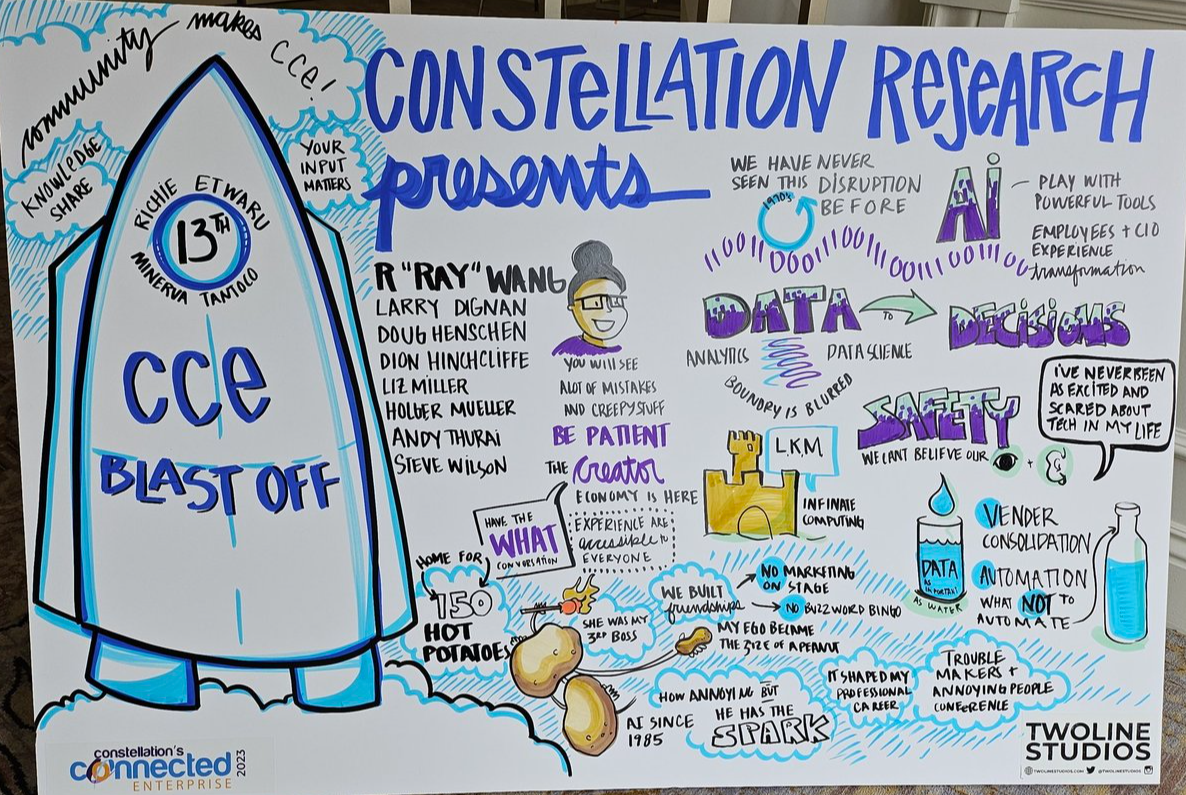
We also talked about automation, the future of work as well as sustainability.
Other stabs at the future you need to know:
Nuggets to know
- HR professionals on a panel were concerned about developing young talent in remote and hybrid work environments. Physical presence is necessary for collaboration, but leadership styles should change for the next generation. In addition, the reason why people work has changed. "Young people today work for self-actualization. What they expect is that their experience at work is going to help them self-actualize. We must reimagine work," said Xapa CEO Christine Heckart.
- Dion Hinchcliffe, Constellation Research analyst, said that there's a lot of pressure to push employees into the office. "Work from anywhere is becoming an endangered species," he said. There's a reason for that: One CXO in attendance said employees need to be in the office. "You can't raise your kids on Zoom. You can't groom the next generation of talent on Zoom either."
More from CCE 2023:
- Software development becomes generative AI's flagship use case
- Congrats to the 2023 SuperNova Award Winners
- Enterprises seeing savings, productivity gains from generative AI
- Ingram Micro's Sanjib Sahoo: Why you need to know DigiOps
- 2024 and beyond at CCE 2023: A few predictions to ponder
- Meet Data Inc. and what a post AI company looks like
- Data and privacy reflections
Business value
Ingram Micro's Chief Digital Officer Sanjib Sahoo said his company is approaching its transformation through a lens of DigiOps, which should prioritize business value and then looks to technologies to enable it.
This business value twist to digital transformation has to happen. Otherwise, attempts to reinvent businesses will fail because innovation and real returns will be disconnected.
Sahoo's talk covered a lot of ground, but here's the bottom line (like literally).
"Every single release or sprint we do has to create value for customers. Getting to DigiOps is about culture and developing real P&L responsibility. How much operating income am I generating? Am I growing margins? Is revenue growing? Technology is always focused on what's possible. Operational folks say 'that's OK, but here's how to do it.' Otherwise, you build the best technology with no adoption."
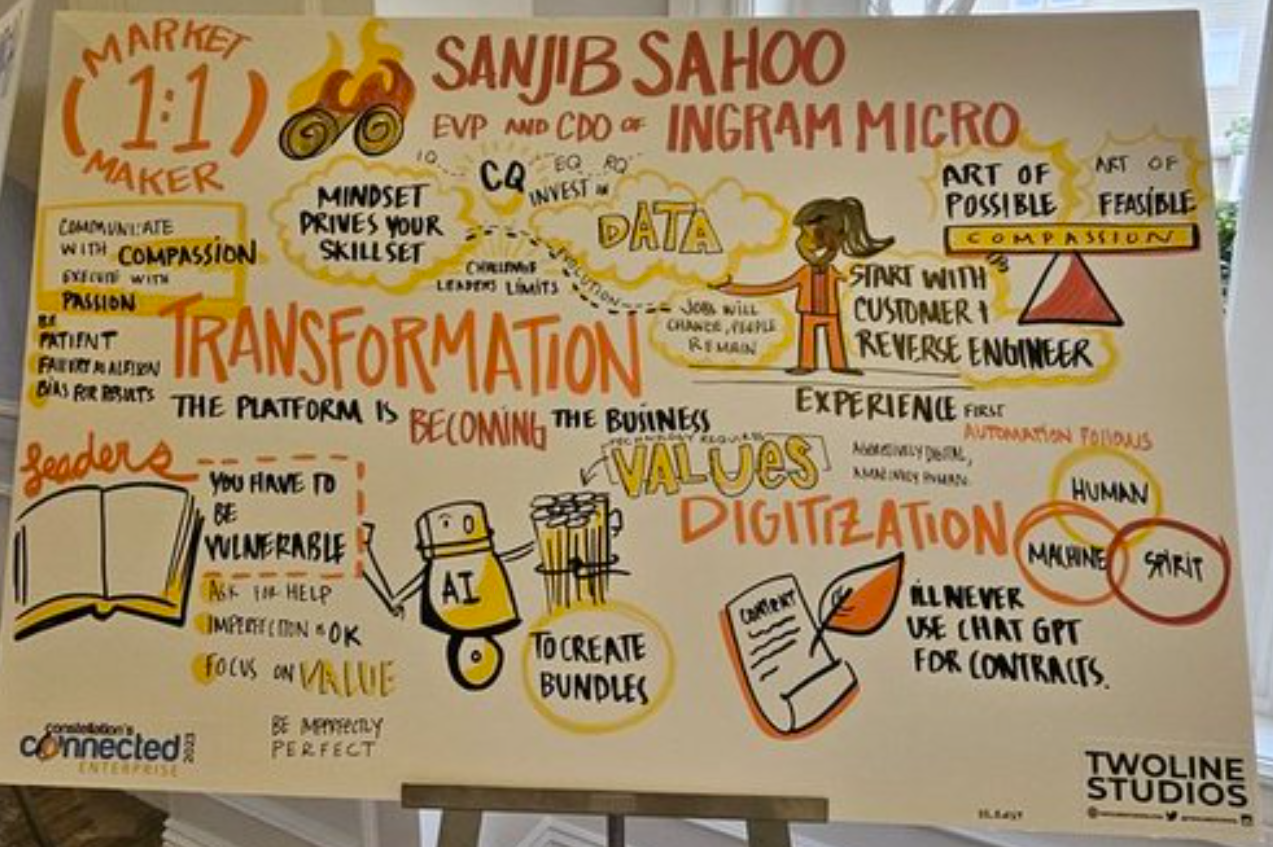
After more than a dozen CXO interviews at CCE with BT150 members and Supernova winners and finalists, I can confirm that business value is front and center. Value is also intertwined with business value.
The need to have a mind shift
While IT, transformation, technology and yes generative AI were key topics CCE, one thing that stuck out to me was the need to shift how you think. CxOs have talked about this a bit before, but it's becoming a chorus.
Sahoo talked about this shift in thinking when it comes to not only transforming operations and business value, but convincing employees to go along for the ride. Sahoo talked about compassion and mindsets about people, management and leading in general.
ServiceNow's Brian Solis, Head of Global Innovation, also talked about shifting mindsets. Solis' point was that technology change is accelerating and there's nothing normal about it. What's needed for the next phase of innovation? He said:
"This takes people coming together to actually believe that they do play a role in our future. The mind shift is to get yourself to believe you play a role in it."
Enterprises also need a mind shift to rethink how business runs beyond mere iteration and bolting technologies onto legacy systems. Companies need to look for ways to build for tomorrow. "The main shift I'm talking about is a path to sustainable innovation because right now we do sprints, we jump in, put something up there and we leave," said Solis. "If we do that organizations fail."
And speaking of mind shifts.
Jeremy Utley, Stanford Adjunct, Venture Investor, Co-Author of "Ideaflow: The Only Business Metric That Matters," said in a keynote that people need to think of ideas a natural occurring phenomenon that has a natural distribution. Ordinary ideas take up most of the curve and delightful and dopey ideas are at the ends.
Utley's big takeaway is that you need dopey ideas to get the delightful ones. "Dopey ideas are the price for delightful ones," said Utley. "We make mistakes as leaders when we just want delightful and ordinary ideas. When you chop off dopey you cut off delightful too."
Generative AI
Needless to say, generative AI was a key theme at CCE 2023, and we focused on multiple threads including threats, opportunities, governance and the outright scary. When it comes to generative AI, it's clear we're not there yet (especially on the enterprise side), but there's a lot to think about. Here are a few things that stuck out for me from a series of conversations.
The good...
Divya Chander, Chair of Neuroscience and Faculty in Medicine, Singularity Group, was upbeat about the generative AI and its ability to expand the pie for multiple groups. She said:
"Historically, it’s been very expensive to access these resources. But computing power is just getting cheaper and cheaper. And that's going to enable more people with good ideas to enter the marketplace, just like you can code using English now. The simple fact that we can fit more transistors onto a chip makes it so that anyone can use these things. It's really good for democratization."
Casey Santos, CIO of Asurion, said customer experiences will improve with generative AI and education can be personalized. Healthcare should also drive more value with AI. "This isn't something that will really open up faster diagnoses, faster treatments and better outcomes," she said.
Richie Etwaru, Principal Inventor Mobeus, outlined everything that's going to change. Language, trust, math, industry, learning, liability, labor, laws and even love. He's optimistic overall, but there's a lot of change ahead.
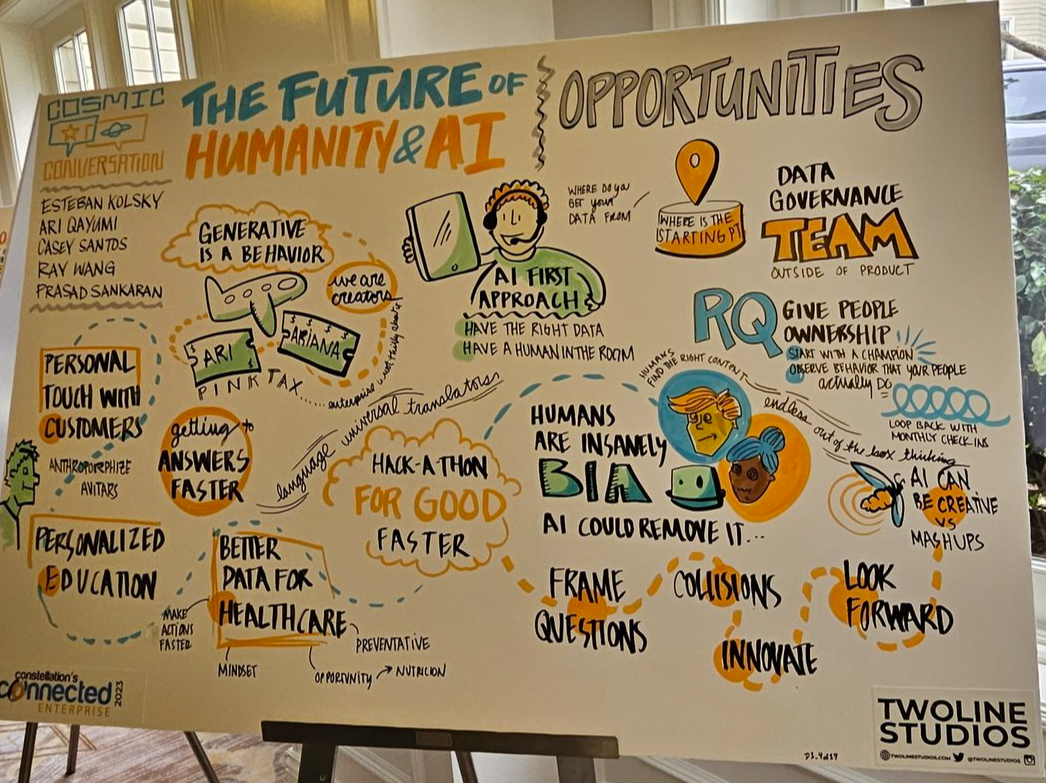
The bad...
Julia Glidden, Board Chair Pivotl, laid out the case why we all should be damn worried about generative AI. In short, think of the kids. She said:
"The risk is to humanity with the emphasis on human. The human ability to love, to touch, to feel. So, I'm going to ask everybody in this room, something I never did in 30 years of tech to join me in creating, informing, and enforcing a robust legal and regulatory framework for AI.
So, we don't sleepwalk into the next social media. And absolutely, and one of the things that we have to think about is the unintended consequences of the technology."
Glidden continued with the theme on a panel and said generative AI can be a crutch that kills critical thinking. "If we take away children's need to critically think, ingest data and analyze it for themselves it means you don't need to read and you don't need to write. You put in a few prompts in, and it happens. Attention in children's brains will atrophy."
Etwaru noted that this AI wave will go horribly wrong for some: "The Enron of AI is going to happen in the next five years."
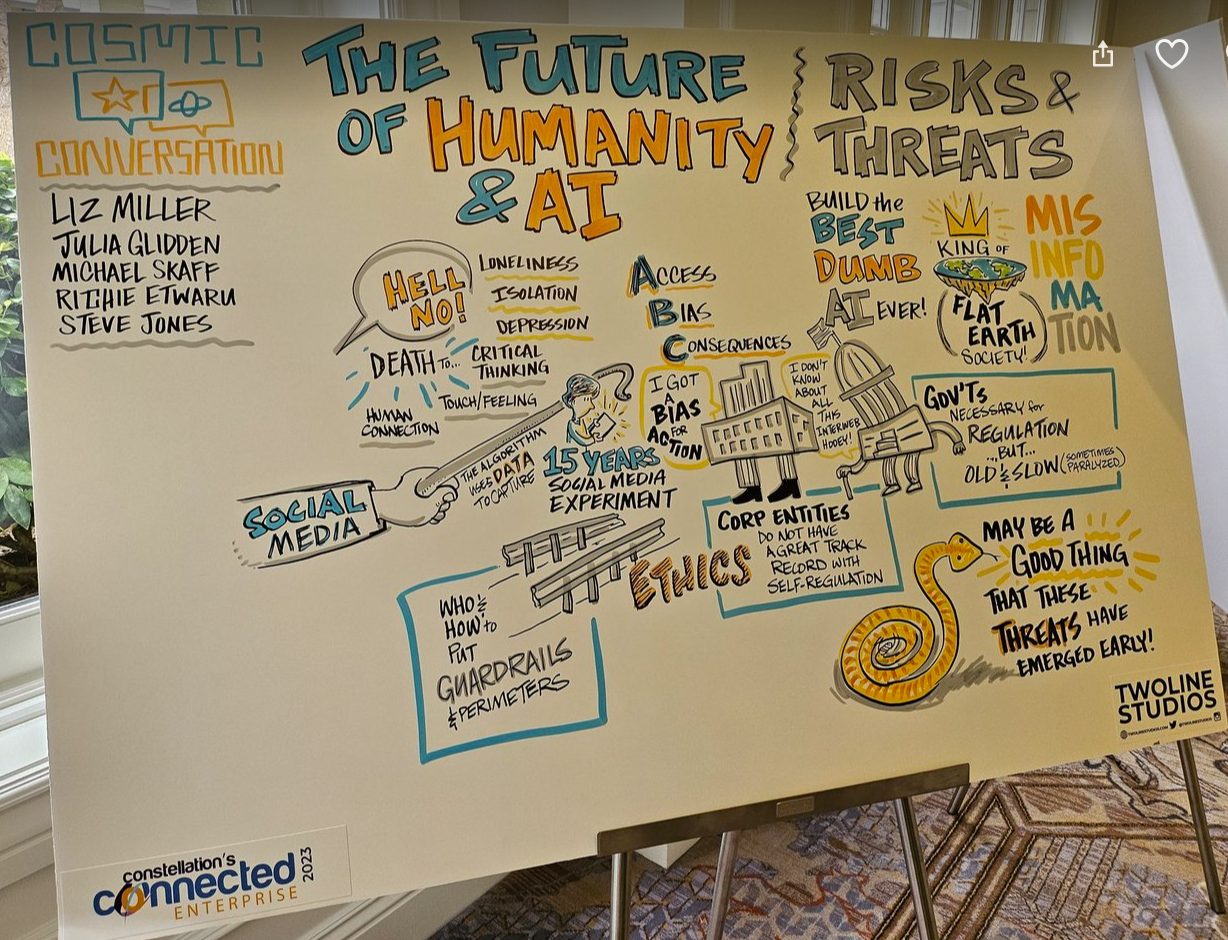
The to-do list
Generative AI will require data governance, privacy issues to be solved as well as new models for business. Simply put, everything will be affected by generative AI.
It's about the data strategy not the AI
Boomi CEO Steve Lucas said generative AI is interesting, but noted we still haven't figured out how it will be used throughout an enterprise.
"I know AI will be here when I don't have to hit zero when I call a company," said Lucas, who said AI should be able to know when he's pissed.
Lucas said enterprise AI will be hampered due to data strategy. "Is your data meaningful?" asked Lucas. "We all need to think about what our inputs are in the organization, what's my model in the middle and what's my output."
If you fast forward 10 years there will be too many LLMs and co-pilots, said Lucas. The differentiator will be your stack and your data.
In short, we're not realizing AI's potential yet because companies are still struggling with their data. Lucas said:
"The reality is what information do you have, that coupled with an LLM will create a truly unique high horsepower scenario that will create competitive advantage?"
Software development
One of the primary use cases for generative AI is software development. Speaking at CCE 2023, Aaratee Rao, Managing Director at JP Morgan Chase, noted that cost efficiency always plays well. "How do we automate, automate, automate and use AI using machine learning, and to really make sure we save money," said Rao, who noted that cost optimization and quality improvements all boost customer experience.
Pauline Yang, a Partner at Altimeter Capital speaking on the same CCE panel, laid out the software development economics. Yang said:
"One of the big use cases that we've seen really take off is developer productivity. If you talk to CTOs, they have all these different metrics--how happy their developers are, how much more pull requests are they getting, or how more productive their senior engineers are. We believe that a lot of companies are becoming software companies, even if you're not selling software, and the costs of engineers right now are so high that 40% productivity gains with your engineers is massive and so is happiness of paid developers. All of those gains are economic value."
Infinite computing
Constellation Research analyst Holger Mueller's 2018 paper on infinite computing was a popular topic given the need to train models on-premises and in the cloud.
Mueller said:
"There's a race for building the supercomputers and building the AI infrastructure. There's a lot of investment going into the compute so larger instances that can do larger workloads."
Cloud providers are in an arms race to build this AI infrastructure and spending billions of dollars to get there.
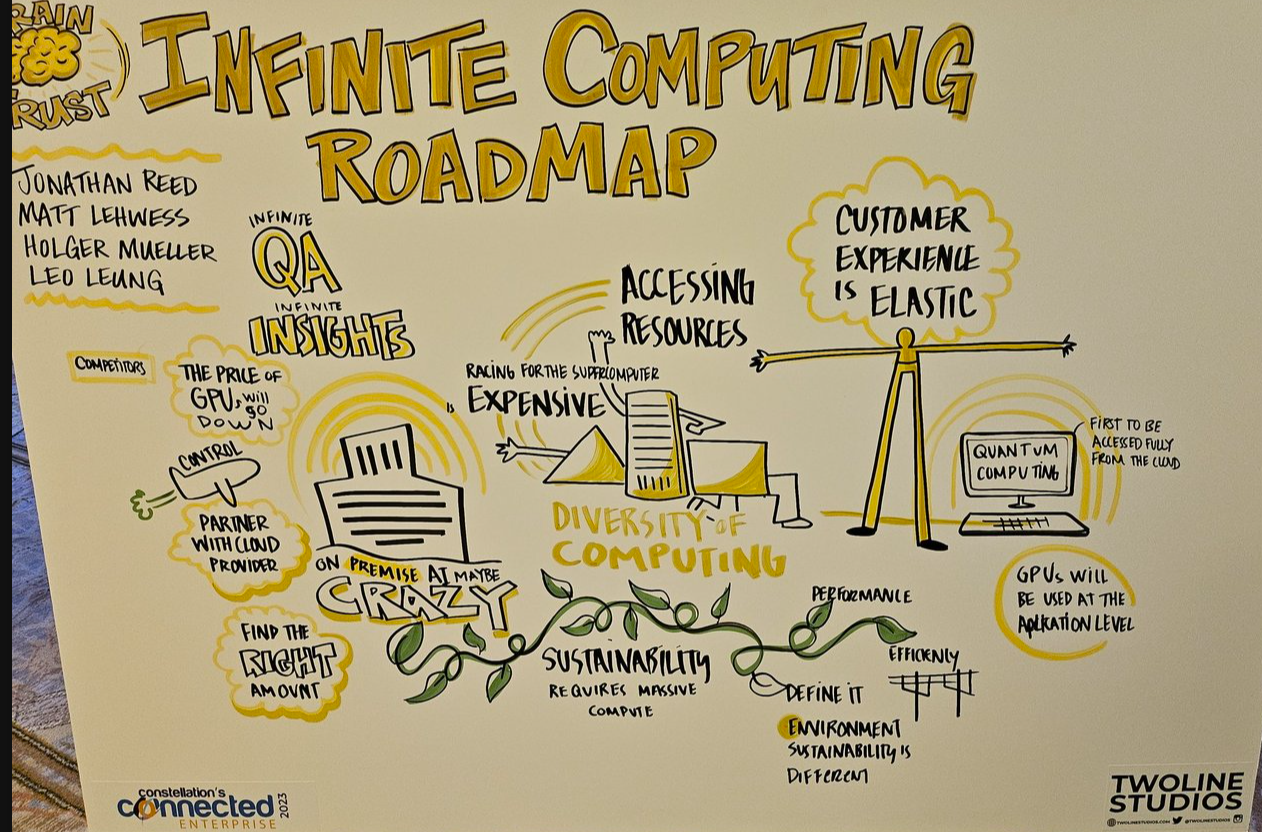
Sustainability
I had a sustainability chat (that'll be on video soon) with Marie Merle Caekebeke, Sustainability Executive - Strategic Engagement at Baker Hughes. She's a Supernova 2023 winner in sustainability that leveraged C3 AI technology to process unstructured data for Baker Hughes' sustainability materiality reports.
Here are a few highlights from our chat.
Caekebeke was initially an AI skeptic but aimed to run a pilot to parse 3,500 stakeholder documents from a broad range of external stakeholders into more than 400,000 paragraphs.
- By starting small, she was able to bring stakeholders together to identify trends and data that would find items that would impact materiality scores.
- The goal was to enable humans to spend more time on strategic initiatives to improve ESG performance instead of manual tasks.
- Baker Hughes' used natural language processing and machine learning pipelines to ensure consistent scoring and root out bias and find relevant information.
ESG was a topic on multiple panels. The big takeaway is that the bottom line is aligned with sustainability efforts.
I also connected with Nate Melby, CIO at Dairyland Power Cooperative, about edge computing and IoT use cases at utilities as well as sustainability. Simply put, the smart grid didn’t quite happen, but the evolution of the concept will be interesting to watch. Melby said in an interview:
“Sustainability is one of our largest goals. It intersects with technology when we talk about efficiency the data, we need to effectively manage the grid but then there's also this other layer, which is sustainability of our utility for the people that need us. We provide power in rural areas. Our whole mission is to provide that power at the lowest cost possible, but also as efficiently as we can now and into the future with diverse resources. We're seeing this energy transition happen.”
Leadership and Careers
Day 3 at CCE 2023 focused on leadership with topics such as employee engagement, managing hybrid workforces, career paths and serving on boards of directors. Some notable quotes include:
Colleen Jordan Hallihan, founder of Qii Consulting, outlined why authentic leadership is so important:
"If you are truly authentic, meaning that you understand what's really important to you, you know what is going to satisfy you. You are acting upon all of those things on a regular basis. That authenticity gives you results. You can wear many hats competently. It correlates with mental and emotional wellbeing."
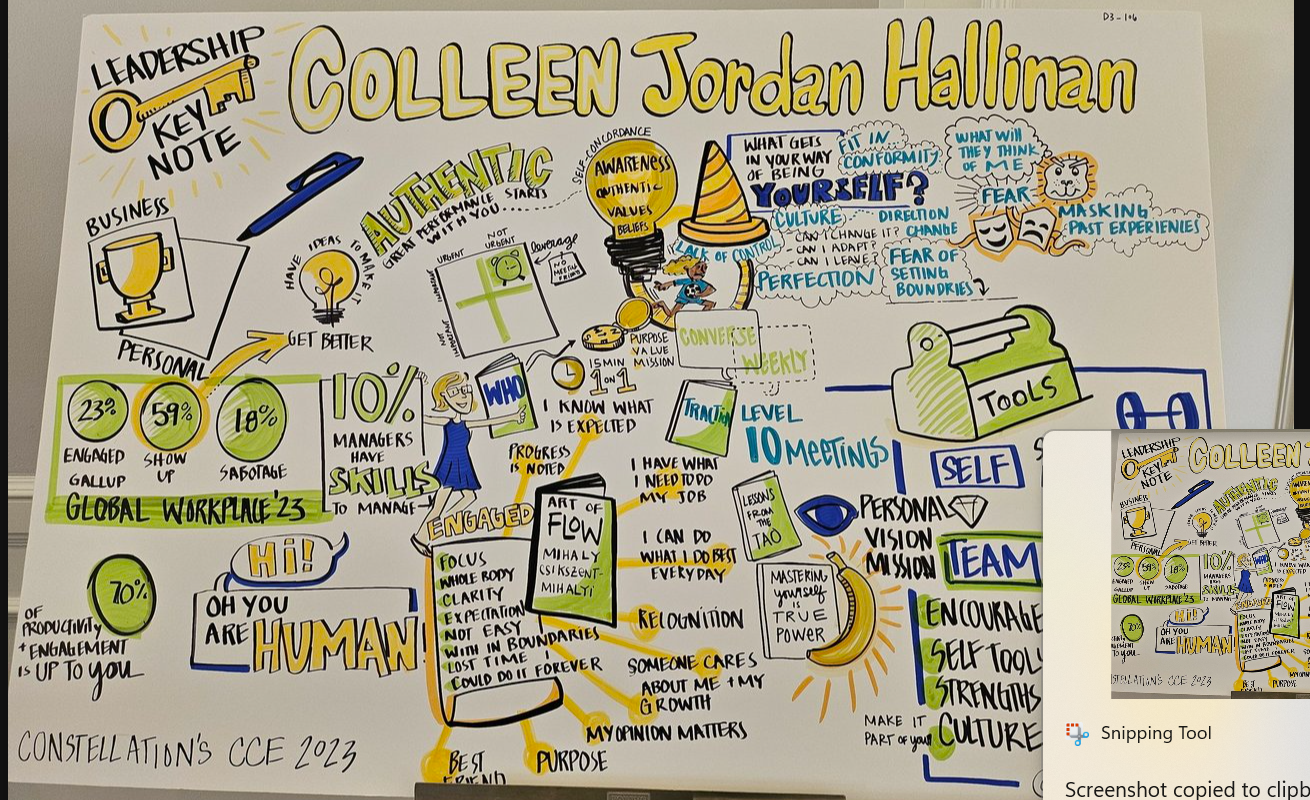
The CXO market
Kathryn Ullrich, Managing Partner for Technology, Private Equity and Diversity at DHR Global, said the job market is looking up.
"The market started picking up this summer. I started seeing more searches come in. I've got a lot more leads that have come in. Typically, September, August, September are very slow months, but leads were coming in in October or August through October. I'm hoping that we get to a fourth quarter that's really good and more vibrant."
Yoko Senga, Partner and co-Head of the Product, Data & Technology Practice at True Search, said:
"We've seen a lot of growth in our CEO and CFO practices. That's the first change that a lot of companies make and as the year has gone on, we are now seeing other sea levels opening up."
Hybrid is dying...
Ullrich said most roles aren't hybrid.
"Hybrid is three days in the office, maybe four days in the office, especially if you're in front of teams. That is what we used to have. It's a full-time office job but you get to work from home on a Friday. I've stopped putting hybrid onto the job specs because they really are in the office."
Metaverse out of favor, but you'll need to invest
And you thought the metaverse was dead.
Raffaella Camera, Head of Brands at Epic Games Unreal Engine, said:
"It would be great not to talk about metaverse but more about 3D worlds in general. I think that the name has been confused too much with specific things like VR and AR. We try to come up with premium environments. Forget the world metaverse. Everyone recognizes we're moving from a 2D world to a 3D world to connect with consumers."
There's some metaverse play coming with the help of Apple. You just wait.
Perhaps, there's a new word needed for what we call metaverse today. "The word is not favorable anymore and the gets a bad rap," said Camera.
Alfred Tom, Executive Director of OMA3 Alliance and CEO of Wivity, said:
"The metaverse is what's going to get you to that next generation of consumer. Next-gen consumers are not watching TV and they're not even watching YouTube anymore. They're in Roblox and they're in Minecraft."
Color me skeptical about the idea that the metaverse winter will end anytime soon. "Stop calling it the metaverse and we'll be fine," said Camera.


